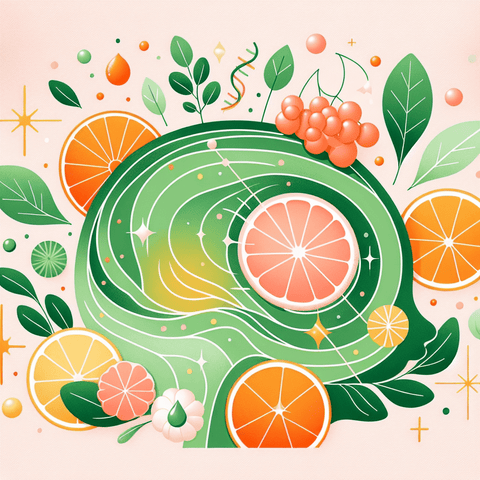Introduction
Hair health is a central concern for millions of people worldwide. Whether due to genetics, hormonal shifts, poor nutrition, or external damage, issues like hair thinning, breakage, and slow growth affect individuals across all age groups. Amid a flood of hair care products and supplements, vitamin C continues to gain attention as a potential solution for enhancing healthy hair growth. But is vitamin C genuinely effective for strengthening hair and stimulating its growth?
Vitamin C, scientifically known as ascorbic acid, is a well-known antioxidant essential for immunity, tissue repair, and the synthesis of collagen—a structural protein crucial for skin and hair health. As one of the most commonly used supplements, its benefits extend far beyond preventing scurvy.
This article explores the scientific evidence, health benefits, and real-world applications of vitamin C in promoting strong and vibrant hair. We delve into how this powerful nutrient works in synergy with our diet, supplements, and lifestyle choices to nourish the scalp, prevent damage, and promote hair vitality. Whether through dietary intake, topical applications, or supplementation, vitamin C may play a significant role in maintaining healthy hair. Read on to uncover everything you need to know about vitamin C and its tangible impact on your hair growth journey.
1. Vitamin C for Hair Growth: The Nutritional Supplement Connection
Vitamin C is a water-soluble essential nutrient that the body cannot produce on its own. It must be obtained through food or supplementation. Structurally defined by its electron-donating capabilities, this potent antioxidant plays numerous roles in human physiology, ranging from immune support to the synthesis of connective tissue.
Its role in hair health is tied to its systemic effects and biochemical interactions. Firstly, vitamin C enhances the absorption of non-heme iron, the form of iron found in plant-based foods. Since iron is crucial for oxygen transportation to hair follicles, deficiency in this area can lead to hair loss.
Furthermore, vitamin C is essential for the biosynthesis of collagen, which provides structural support to hair shafts and skin. A lack of sufficient collagen can weaken hair strands, increase breakage, and reduce elasticity. By facilitating collagen formation and enhancing nutrient absorption, vitamin C helps create a suitable physiological environment for healthy hair growth.
Scientific studies underscore this connection. For instance, research published in the journal Dermatology and Therapy found that individuals with low serum ascorbic acid levels experienced more frequent occurrences of diffuse hair thinning. Systematic reviews have concluded that antioxidant protection from reactive oxidative damage to the scalp plays a key role in preventing hair aging and follicle miniaturization.
The most common forms of vitamin C supplements available on the market include:
- Ascorbic acid: The pure form absorbed efficiently and widely used.
- Buffered vitamin C: Combined with minerals such as calcium, magnesium, or potassium to reduce stomach acidity.
- Effervescent tablets and powders: Dissolved in water for quick absorption and pleasant flavoring.
At Topvitamine.com’s vitamin C collection, you can explore a variety of high-quality, scientifically-formulated supplements that meet dietary preferences like vegan, gluten-free, and sugar-free options.
The recommended dietary allowance (RDA) for vitamin C is 75mg for women and 90mg for men. However, for therapeutic or preventative purposes, higher dosages—ranging between 500 to 2000mg/day—are commonly used under medical supervision. The tolerable upper intake level (UL) for adults is set at 2000mg/day to prevent gastrointestinal discomfort.
It’s important to note that while vitamin C supports hair health and growth, it is not a miracle cure. Myths suggesting that large doses of vitamin C instantly reverse baldness are misleading. Hair regrowth is a complex biological process influenced by numerous factors, and vitamin C should be part of a multifaceted approach to well-being.
In sum, vitamin C supplementation plays a vital background role in promoting hair growth by supporting systemic health functions essential for maintaining a healthy scalp and strong hair strands.
2. Enhancing Hair Health Through Nutrition: The Role of Vitamin C
The journey to vibrant, resilient hair starts with the food on your plate. A balanced diet, abundant in vitamins, minerals, protein, and healthy fats, lays the foundation for optimal hair growth and minimal shedding. Vitamin C is a critical micro-nutrient within this nutritional framework, acting both as a protector and facilitator in the complex ecosystem of hair health.
One of the earliest signs of vitamin C deficiency is weak or sluggish hair growth. This deficiency, known as scurvy in extreme cases, is now rare in the developed world but milder forms are still common due to poor dietary habits. Hair problems peak when vitamin C levels are sub-optimal—think brittle hair shafts, lackluster shine, split ends, and slow follicular regeneration.
Vitamin C works synergistically with other nutrients, amplifying their benefits. For example:
- Iron: As mentioned earlier, vitamin C enhances the intestinal absorption of non-heme iron by converting it into a form that is more readily absorbed. Iron deficiency is a leading cause of anemia, which affects hair follicle nourishment and contributes to hair fall.
- Zinc: Crucial for hair tissue growth and repair, zinc also helps maintain the oil glands that surround the follicles. Vitamin C’s antioxidant nature can help preserve zinc’s molecular integrity in the body.
- Biotin: Known widely for promoting strong hair and nails, biotin works in concert with vitamin C for keratin production—the protein making up the majority of hair structure.
On the food front, vitamin C can be added easily through a variety of fruits and vegetables, including berries, citrus fruits, kiwi, bell peppers, Brussels sprouts, and kale. These whole foods offer the additional advantage of fiber and phytonutrients, which further support overall health.
The debate between food-based versus supplemental vitamin C is ongoing. While natural absorption from food is ideal, those at nutritional risk or recovering from illness may benefit from supplements to restore optimal nutrient levels effectively. The supplement route also provides controlled dosing and bioavailability enhancements such as liposomal delivery systems.
Improving nutrient absorption is key when aiming for better hair health. Taking vitamin C with meals enhances iron uptake, while reducing competing elements like high calcium fiber intake at the same meal can boost efficacy. For instance, avoid consuming caffeine immediately alongside vitamin C-rich meals, as it may hinder its absorption.
Finally, it's vital to remember the phrase: "you are what you absorb," not just what you eat. The goal isn't to rely solely on supplementation, but to blend a vibrant, colorful diet with thoughtful supplementation for comprehensive health.
3. Antioxidant Benefits of Vitamin C and Their Impact on Hair
One of vitamin C's most celebrated roles in the realm of hair and skin health is its function as a powerful antioxidant. Antioxidants are molecules capable of stabilizing free radicals—highly reactive atoms with unpaired electrons that damage cells, proteins, and DNA through oxidative stress.
Hair is susceptible to oxidative stress just like any other part of the body. Pollution, UV exposure, smoking, chronic stress, and poor diet all increase the production of free radicals. These damaged cells trigger inflammation, prematurely age the scalp, weaken hair follicles, and may even contribute to several forms of alopecia.
Vitamin C interferes with these oxidative processes by neutralizing free radicals before they can damage cellular structures in the scalp and hair shaft. This preservation effect means hair follicles operate longer and more efficiently—delaying shedding cycles, maintaining pigment, and supporting the transition from telogen (resting) phase back to anagen (growth phase).
Scientific publications such as the Journal of Clinical and Aesthetic Dermatology have referenced the role of vitamin C as a catalyst in cellular regeneration and its effectiveness in reducing epidermal damage from environmental pollutants. Other articles in the International Journal of Trichology have emphasized antioxidants as protective elements for keratinocytes, the cells lining hair follicles.
Vitamin C's antioxidant benefits extend to the stabilization of sebum-producing glands. Balanced sebum production ensures hair remains moisturized, resilient, and free of irritation-related inflammation that can clog follicles and stunt growth.
To further support antioxidant intake, consider pairing vitamin C with other complementary nutrients. For example, magnesium is essential for more than 300 enzymatic reactions in the body and supports antioxidant defenses at a cellular level. You can explore high-quality magnesium supplements at Topvitamine.com to support this synergy.
Adding antioxidant-rich foods like blueberries, broccoli, grapefruit, and tomatoes into your meals can also amplify the overall protective effect. These foods not only provide vitamin C but offer a broad spectrum of compounds like flavonoids, lycopene, and polyphenols, which shield skin and hair tissue from oxidative damage.
Incorporating vitamin C and related antioxidants into your daily routine—whether through food, oral supplementation, or topical application—helps defend the scalp's microenvironment, preventing premature aging of hair follicles and fortifying your strands against damage.
4. Scalp Nourishment with Vitamin C: Promoting a Healthy Environment for Hair Growth
Great hair begins with a healthy scalp. Just as you wouldn’t expect a flower to bloom in poor soil, your hair can’t thrive without adequate scalp nourishment. Vitamin C contributes meaningfully to maintaining and improving the physiological conditions of the scalp through its anti-inflammatory and circulatory benefits.
The scalp, composed of numerous tiny blood vessels, is responsible for sustaining hair follicles by delivering oxygen and nutrients. Low circulation or inflamed capillaries can disrupt the growth cycle, causing thinning or stunted hair. Vitamin C supports microcirculation by shielding blood vessel integrity and optimizing capillary function, which in turn nourishes each follicle more efficiently.
Additionally, a high antioxidant environment, made possible through vitamin C, reduces inflammation caused by oxidative triggers like UV radiation or chemical-heavy hair products. Several studies have highlighted increased blood flow and decreased inflammatory markers in tissue samples treated with ascorbic acid as compared to controls. Less localized inflammation supports longer anagen (growth) phases and reduces hair shedding phenotypes.
Vitamin C also modulates keratinocyte activity and enhances barrier function, preventing scalp flaking and microbial growth—two hidden causes of scalp discomfort and follicular blockage.
While oral consumption remains the most evidence-backed method of supplementation, topical applications are gaining traction. Although they do not reach systemic nutrient concentrations, leave-on vitamin C serums and scalp masks formulated with stabilized ascorbic acid may support localized dermal regeneration and inflammation reduction. Make sure the product is pH-balanced, as vitamin C tends to degrade quickly under alkaline conditions.
Combining topical treatments with oral intake creates a comprehensive approach. Consider taking a vitamin C supplement from trusted sources such as the vitamin C collection on Topvitamine.com, and incorporating it alongside scalp massage, hydration, and lightweight serums for enhanced blood circulation and vitality.
Finally, don't underestimate the impact of lifestyle and hair care habits. Use sulfate-free shampoos, avoid frequent harsh heat treatments, and wear protective styles to prevent further scalp stress. Vitamin C’s balancing role in this ecosystem promotes not just hair growth but long-term scalp health.
5. Collagen Production and Its Connection to Hair Growth: Can Vitamin C Help?
Collagen, the most abundant protein in the human body, plays an essential role in building and maintaining skin, tendons, ligaments, and hair. It provides each strand of hair with tensile strength, volume, and elasticity. As we age—or in the absence of proper nutrition—collagen levels naturally decline, impacting hair thickness and robustness.
Vitamin C is an indispensable cofactor in the enzymatic process of synthesizing collagen. Without it, the body’s ability to form new collagen fibers is significantly impaired. The specific mechanism involves hydroxylation of proline and lysine—key amino acids—in the formation of the triple-helical collagen structure. In simpler terms, no vitamin C, no strong collagen.
Improved collagen expression strengthens cellular structure both around the follicle (dermal papilla) and in the extracellular matrix, supporting anchoring strength and resisting premature shedding. Emerging evidence from models in dermatological studies show that subjects receiving combined vitamin C and hydrolyzed collagen peptides experienced improved skin elasticity, hair fullness, and reduced shedding within a few months.
Supplements that combine hydrolyzed collagen with vitamin C are becoming increasingly popular for hair, skin, and nails. These combinations may offer a bioavailable, efficient pathway to boost structural protein production throughout the integumentary system. That said, EFSA only permits health claims that state vitamin C "contributes to normal collagen formation for the normal function of skin."
To enhance collagen-building pathways, consider integrating marine collagen with vitamin C into your supplementation routine. Many products available at Topvitamine.com offer this synergy in a single, convenient formula. When used regularly, these products support healthier roots and more resilient hair strands.



